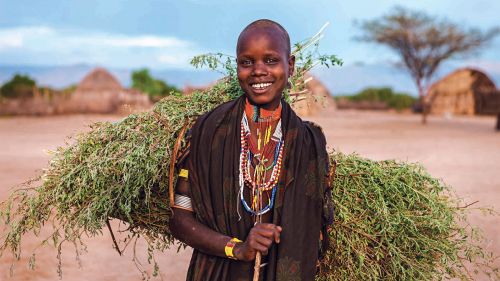The Critical Role of Women in Transforming the Food System

Women "agropreneurs" all over the world are key players in transforming food systems.
Women agropreneurs
Every day, women around the world make critical contributions to food systems at the household, community, regional, and global levels. Take, for example, a mother in Zambia who tends to her vitamin A maize field, harvesting and storing the crop to feed her family; the woman who sells her nutritious iron beans in a Rwandan market; and a young woman “agropreneur” who produces nutritious food products made with vitamin A cassava in Nigeria. These women are delivering micronutrient-enriched, biofortified foods to their communities, improving the nutrition and health of their household members; they are also key players in transforming their food systems to deliver healthier diets.
HarvestPlus is a global leader in the advancement of biofortification technology and evidence. By the end of 2018, through delivery efforts of HarvestPlus and its hundreds of partners, an estimated 7.6 million rural farming households across three regions (Africa, Asia, and Latin America and the Caribbean) have benefited from more nutritious crops such as vitamin A maize, cassava and orange sweet potato, iron beans and pearl millet, and zinc wheat and rice.
Since its inception, HarvestPlus has identified and focused on women as key drivers who make nutrition -related decisions for their households and have important roles not only in the preparation and consumption of nutritious foods but also in production decisions on which varieties to grow. Through various gender-focused evaluations of country delivery programs, HarvestPlus learned that men and women have different roles in the adoption of and access to new technologies, participation and access to markets, and decisions about processing and storing crops; both gender perspectives must be carefully considered when delivering nutrition-sensitive agriculture interventions.
These gendered differences are particularly important as HarvestPlus works to catalyze the public and private sectors and civil society organizations, as well as international finance institutions and UN-based agencies, to scale up biofortified crops and foods. New agricultural technologies such as biofortification need to meet the consumer preferences of both male and female farmers, the nutrition needs of multiple subpopulations (especially women, adolescent girls, and children under 5, who have the highest nutrition needs but often the most limited access to nutrient-dense foods), support gender-equitable decision making, and avoid unintended consequences to women such as increased workload or loss of income.
Demand for biofortified crops and food products is growing rapidly, particularly among women who see them as a way to affordably provide nutritious foods to their families and communities. Women also see opportunity through biofortified crops to establish small- and medium-size enterprises (SMEs) that process and market biofortified foods.
Nigeria is a hotbed of women-led SME activity in biofortification, where they are making progress in typically male-dominated sectors. For example, Atinuke Lebile’s passion for agriculture and providing nutritious food to young children and women led her to co-found an agro-processing company while attending university. The company, Cato Foods, is dedicated to developing innovative food products made from biofortified vitamin A cassava that are not only nutritious but are well liked by children.
Bola Adeyemo combined her passion for farming with her dedication to improving children’s health in her community so that every child can meet their full potential. Adeyemo created the Senator Adeyemo Women Empowerment Center (SAWEC). The cornerstone of SAWEC is a small food processing center where local women and adolescent girls are trained in food processing and taught business skills to improve their household’s nutrition and health by using biofortified vitamin A cassava. Ms. Adeyemo (Mama SAWEC as she is better known in her community) mobilized a network of farmers, agrodealers, and processors into a well-functioning and ever-growing growing end-to-end supply chain for biofortified vitamin A cassava stems, tubers, and food products, to bring these products to many more people to improve their nutrition and health outcomes.
These examples from Nigeria show how women are increasingly taking the initiative in food systems innovation, productivity, and leadership. Yet, there is still a long way to go; despite global commitments to empowering women in the UN Sustainable Development Goals (notably, Goal 5 targeting gender equality), gender gaps remain large.
The good news is that there is a renewed focus on empowerment of women in agriculture and economic development, and growing recognition of their pivotal roles in food systems. In the U.S., recent legislation (S.3247 - 115th Congress) commits the government to support women’s economic empowerment through programs carried out by United States Agency for International Development, notably through increased support to women-led micro, small, and medium-sized businesses. Canada’s Feminist International Assistance Policy acknowledges the importance of alleviating economic inequalities and empowering women in order to reduce poverty, improve health, and support global markets. These types of policies can support women entrepreneurs like Atinuke and Mama SAWEC and could benefit many more women around the world to improve food systems to deliver healthier diets
The mechanisms through which women can be empowered to participate in—if not lead—food systems transformations, and how women can be better served through food systems, were articulated in the Regional Strategic Analysis and Knowledge Support System (ReSAKSS) 2019 Annual Trends and Outlook Report, Gender Equality in Rural Africa: From Commitments to Outcomes, which supports progress toward Comprehensive Africa Agriculture Development Programme (CAADP) targets. In case study 4 included in that report, HarvestPlus spelled out its commitment to better understand gendered differences for access, preferences, and opportunities along the seed-to-food value chain for biofortified crops, and to provide technical assistance to both women and men to overcome barriers for widespread adoption.
Scaling up biofortified foods with gendered considerations, and supporting women in SMEs, are only two examples of how institutions are prioritizing women in food systems. There is broad agreement that an overhaul of food systems needs to happen; however, true transformation cannot be achieved without a prominent role for women around the world, like Antinuke Lebile and Mama SAWEC.